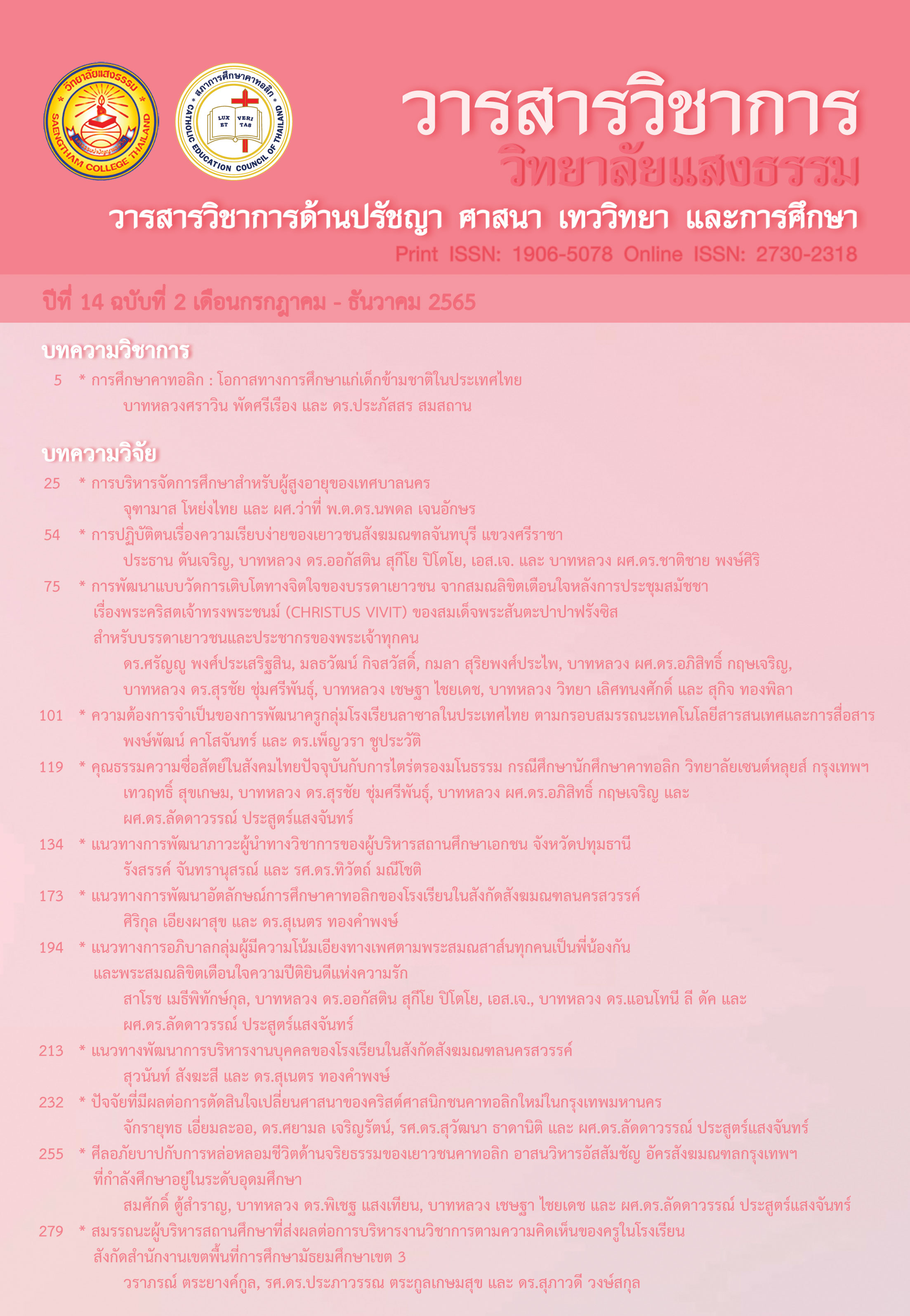A development a model for measuring the mental growth of youth. From the POST-SYNODAL APOSTOLIC EXHORTATION CHRISTUS VIVIT OF THE HOLY FATHER FRANCIS TO YOUNG PEOPLE AND TO THE ENTIRE PEOPLE OF GOD
Main Article Content
Abstract
The purpose of this study was to develop a model to measure the mental growth of youth and to examine the quality of the youth mental growth scale. The scale was built on the basis of Pope Francis's notion of Spiritual Intelligence and the Post-Conference Scriptures on CHRISTUS VIVIT for all. youth and all the people of God By spiritual growth (Spiritual Intelligence) is the ability to adjust the mind. ability Understand yourself in all dimensions, both physically and mentally, and be able to answer questions related to the meaning, purpose and value of life including the relationship between himself and all things around him which will make it possible to think Consider appropriate solutions to the problems faced by the General Assembly and the posthumous dioceses on the life of Christ (CHRISTUS VIVIT) is a document on the pastoral work of youth in the modern era. from Pope Francis Data were collected from 456 participants who were Catholic youths aged 13-25 years in 11 diocese.
The results showed that The measure of the mental growth of the youth content The content consistency index (IOC) was .8 – 1.00. The correlation between item total correlation was .518 to .694. constituent confidence The values were in the range of .841 - .898 and the confidence in the whole version was .884. Examining the conformity of the components of the Youth Mental Growth Scale found that the model was consistent with the empirical data at 1.288. RMSEA is .024, CFI is .98, GFI is equal to .96 RMR is equal to .12 shows that The five components of the mental growth of youth are clearly indicators of the youth's mental growth.
Article Details

This work is licensed under a Creative Commons Attribution-NonCommercial-NoDerivatives 4.0 International License.
- The academic and research articles, as well as the content and opinions expressed therein, published in Saengtham College Journal are solely the responsibility of the respective author(s).
- Articles published in Saengtham College Journal are the property of Saengtham College. Reproduction, modification, or dissemination of all or part of the content in any form without written permission from Saengtham College is prohibited.
- Articles published in Saengtham College Journal are protected under the Copyright Act.
References
ณัฐภรณ์ นรพงษ์. (2553). การวิเคราะห์เปรียบเทียบโมเดลประยุกต์และโมเดลบูรณาการการวัดความฉลาดทางจิตวิญญาณของนักเรียนมัธยมศึกษาตอนปลายในบริบทสังคมไทย. [วิทยานิพนธ์ปริญญามหาบัณฑิต]. จุฬาลงกรณ์มหาวิทยาลัย.
บุญธรรม กิจปรีดาบริสุทธิ์. (2540). ระเบียบวิธีวิจัยทางสังคมศาสตร์. คณะสังคมศาสตร์และมนุษยศาสตร์ มหาวิทยาลัยมหิดล.
ประณต เค้าฉิม. (2549). จิตวิทยาวัยรุ่น. ภาควิชาจิตวิทยา คณะมนุษยศาสตร์ มหาวิทยาลัยศรีนครินทรวิโรฒ.
ราชบัณฑิตยสถาน. (2546). พจนานุกรมฉบับราชบัณฑิตยสถาน พ.ศ.2542. นานมีบุ๊ค พับลิเคชั่นส์.
ปรียาพร วงศ์อนุตรโรงน์. (2551). จิตวิทยาการศึกษา : Educational psychology. ศูนย์สื่อเสริมกรุงเทพ.
วัลลภ ลำพาย. (2547). เทคนิควิจัยทางสังคมศาสตร์. มหาวิทยาลัยเกษตรศาสตร์.
สภาประมุขบาทหลวงโรมันคาทอลิกแห่งประเทศไทย. (2560). สมณลิขิตเตือนใจ หลังการประชุมสมัชชา เรื่องพระคริสตเจ้าทรงพระชนม์ (CHRISTUS VIVIT) ของสมเด็จพระสันตะปาปาฟรังซิส สำหรับบรรดาเยาวชน และประชากรของพระเจ้าทุกคน. โรงพิมพ์อัสสัมชัญ.
อัญชลี ศุภวิทยาภินันท์. (2552). ความสัมพันธ์ระหว่างเชาวน์ด้านจิตวิญญาณ ความสุข และพฤติกรรมการเป็นสมาชิกที่ดีขององค์กร: กรณีศึกษาของโรงพยาบาลเอกชนแห่งหนึ่งในจังหวัดนครปฐม. [วิทยานิพนธ์ปริญญามหาบัณฑิต]. มหาวิทยาลัยธรรมศาสตร์.
Amram, Yosi. (2007). The Seven Dimensions of Spiritual Intelligence: An Ecumenical, Grounded Theory. Paper Presented at the Conference of the 115th American.
Cooperman, A., Townsend, T. & O’Connell, T. (2014). How U.S. Catholics View Pope Francis: In Their Own Words. Communications, Religion & Public Life Project. Pew Reacher Center.
Emmons, Robert A. (2002). Is Spirituality an Intelligence? Motivation, Cognition and the Psychology of the Ultimate Concern. The International Journal for the Psychology of Religion.
Fishbein, M. & Ajzen, I. (1975). Belief, Attitude, Intention, and Behavior: An Introduction to theory and research. Addison-Wesley.
Maibach, E., Leiserowitz, A., Roser-Renouf, C., Myers, T., Rosenthal, S. & Feinberg, G. (2015). The Francis Effect: How Pope Francis Changed the Conversation about Global Warming. George Mason University Center for Climate Change Communication.
Oskamp, S. (1977). Attitude and Opinion. Prentice-Hall.
Piaget, J. (1971). The theory of stages in cognitive development. McKay.
Richard Wike; & Russ Oates. (2014). Pope Francis’ Image Positive in Much of World. Less Well-Known Outside of Latin America and Europe.
Shaw, M.E. And Wright, J.N. (1967). Scale for the Measurement of Attitudes. McGraw-Hill.
Vaughan, F. (2002). What Is Spiritual Intelligence?. Journal of Humanistic Psychology.
Yando, R. M., & Kagan, J. (1968). The effect of teacher tempo on the child. Child Development. n.p.
Zohar, Danah; & Marshall, Ian. (2002). SQ: Connecting with Our Spiritual Intelligence. New York: Bloomsbury.


